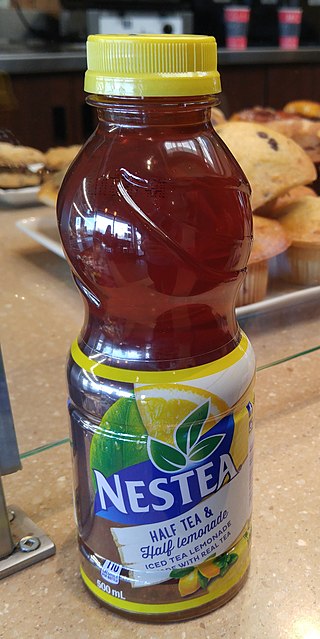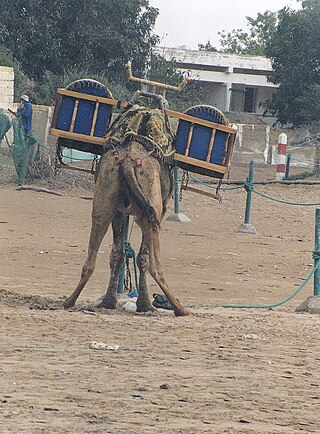
A dietary supplement is a manufactured product intended to supplement a person's diet by taking a pill, capsule, tablet, powder, or liquid. A supplement can provide nutrients either extracted from food sources, or that are synthetic. The classes of nutrient compounds in supplements include vitamins, minerals, fiber, fatty acids, and amino acids. Dietary supplements can also contain substances that have not been confirmed as being essential to life, and so are not nutrients per se, but are marketed as having a beneficial biological effect, such as plant pigments or polyphenols. Animals can also be a source of supplement ingredients, such as collagen from chickens or fish for example. These are also sold individually and in combination, and may be combined with nutrient ingredients. The European Commission has also established harmonized rules to help insure that food supplements are safe and appropriately labeled.

GSK plc is a British multinational pharmaceutical and biotechnology company with headquarters in London. It was established in 2000 by a merger of Glaxo Wellcome and SmithKline Beecham, which was itself a merger of a number of pharmaceutical companies around the Smith, Kline & French firm.

Unilever PLC is a British multinational fast-moving consumer goods company founded on 2 September 1929 following the merger of British soap maker Lever Brothers and Dutch margarine producer Margarine Unie. It is headquartered in London, England.

Green tea is a type of tea made from the leaves and buds of the Camellia sinensis that have not undergone the withering and oxidation process that creates oolong teas and black teas. Green tea originated in China in the late 1st millennium BC, and since then its production and manufacture has spread to other countries in East Asia.

Kombucha is a fermented, lightly effervescent, sweetened black tea drink. Sometimes the beverage is called kombucha tea to distinguish it from the culture of bacteria and yeast. Juice, spices, fruit or other flavorings are often added.

Flavonoids are a class of polyphenolic secondary metabolites found in plants, and thus commonly consumed in the diets of humans.

Hindustan Unilever Limited (HUL) is an Indian fast-moving consumer goods company, headquartered in Mumbai. It is a subsidiary of the Anglo-Dutch company Unilever. Its products include foods, beverages, cleaning agents, personal care products and other consumer staples.

The American Heart Association (AHA) is a nonprofit organization in the United States that funds cardiovascular medical research, educates consumers on healthy living and fosters appropriate cardiac care in an effort to reduce disability and deaths caused by cardiovascular disease and stroke. They are known for publishing guidelines on cardiovascular disease and prevention, standards on basic life support, advanced cardiac life support (ACLS), pediatric advanced life support (PALS), and in 2014 issued the first guidelines for preventing strokes in women. The American Heart Association is also known for operating a number of highly visible public service campaigns starting in the 1970s, and also operates several fundraising events.
The health effects of tea have been studied throughout human history. In clinical research conducted over the early 21st century, tea has been studied extensively for its potential to lower the risk of human diseases, but there is no good scientific evidence to support any therapeutic uses other than possibly increasing alertness, an effect caused by caffeine in the tea leaves.

PG Tips is a brand of tea in the United Kingdom manufactured by Lipton Teas and Infusions.

Brooke Bond is a brand of tea owned by Lipton Teas and Infusions, except in India, Nepal, and Indonesia where it is owned by Unilever. Brooke Bond was formerly an independent tea-trading and manufacturing company in the United Kingdom, known for its PG Tips brand and its Brooke Bond tea cards.
Tazo Tea Company (TAZO) is a tea and herbal tea blender and distributor founded in Portland, Oregon. It is now a Lipton Teas and Infusions division and is based in Kent, Washington.

Nestea is a Swiss brand of iced tea and other beverages owned by Nestlé, manufactured by The Coca-Cola Company and distributed by Nestlé's beverage department in the United States and by Beverage Partners Worldwide (BPW), a joint venture between The Coca-Cola Company and Nestlé, in the rest of the world. It competes with Unilever/PepsiCo's Lipton Iced Tea and Fuze Tea. Nestea provides a variety of tea products, including liquid and powdered tea concentrates, refrigeratable teas, and ready-to-drink bottles dispensed by vendor or vending machine. The beverage comes in several flavors, depending on the country.

Theanine, also known as L-theanine, L-gamma-glutamylethylamide, or N5-ethyl-L-glutamine, is an amino acid analogue of the proteinogenic amino acids L-glutamate and L-glutamine. It is produced by certain plants such as Camellia sinensis, and by some fungi. It was discovered in 1949 as a constituent of green tea and isolated from gyokuro leaves in 1950. It constitutes about 1–2% of the dry weight of green tea leaves.
Alcohol has a number of effects on health. Short-term effects of alcohol consumption include intoxication and dehydration. Long-term effects of alcohol include changes in the metabolism of the liver and brain, with increased risk of several types of cancer and alcohol use disorder. Alcohol intoxication affects the brain, causing slurred speech, clumsiness, and delayed reflexes. There is an increased risk of developing an alcohol use disorder for teenagers while their brain is still developing. Adolescents who drink have a higher probability of injury including death.
Unilever Pakistan Limited, formerly known as Lever Brothers Pakistan Limited, is a Pakistani fast-moving consumer goods company based in Karachi. It is a subsidiary of the British multinational company Unilever.

Lipton is a brand named after its founder, Sir Tom Lipton who started an eponymous grocery retail business in the United Kingdom in 1871. The brand was used for various consumer goods sold in Lipton stores, including tea from 1890 for which the brand is now best known.

Calippo is a frozen dessert introduced by Unilever in 1984 to European markets.

Camel urine is a liquid by-product of metabolism in a camel's anatomy. Urine from camels has been used in medicine for centuries, being a part of ancient Bedouin, ayurvedic and Muslim tradition. According to the World Health Organization, the use of camel urine as a medicine lacks scientific evidence. After the spread of MERS-CoV infections, the WHO urged people to refrain from drinking "raw camel milk or camel urine or eating meat that has not been properly cooked".

Lipton Teas and Infusions is a privately held company based in Amsterdam, Netherlands, that produces tea and other herbal drinks.

















